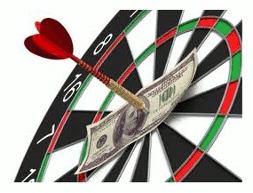Trading the forex market is inherently risky and brings with it the possibility of losing money anytime you enter a trade, says Nial Fuller of Learn To Trade The Market.

Whilst this is a fact that most traders are fully aware of, it's a curious notion that many traders seem to ignore money management all together, or pay very little attention to it. The fact that most traders lose money in the markets is not really surprising if you consider that most traders also have no money management plans and mostly ignore the fact that they can lose money on any one trade they enter. This article will give you five tips, which I hope will assist you in learning to manage your money properly as you trade the forex market.
Tip 1: Accept that you CAN lose on ANY trade.and act
accordingly
The first and perhaps most important step to successful
forex money management is accepting the fact that you
can lose on any trade you enter. Many traders convince themselves that "this
trade" has to be a winner because it looks so "perfect," they then risk more
than they are comfortable with losing and they "expect" to win on the trade.
Even if this works out three or four trades in a row, it's bound to back-fire
eventually. When you eventually hit that losing trade that you've risked too
much on, it will inevitably cause a snow-ball effect of emotional trading
because you will feel an urge to "make back" all the money you just lost.
Traders who risk too much on a trade are gamblers, and gamblers typically lose money, just like most traders do. The best thing to do is to NEVER risk more money than you are emotionally OK with losing per trade. Perhaps the best way to judge if you are OK with losing an amount on a trade is to gauge how much you think about it, if you find that you are thinking about a trade all the time or if you're up all night thinking about and watching your trades and not sleeping, you have clearly risked too much. You should be totally OK with the amount you've risked per trade, and that means that you basically forget about the trade after you enter it because the amount you've risked is not significant enough to cause you to become emotional.
Tip 2: Preserve your trading capital by not
over-trading
Most traders trade too much, and that is just a fact.
Over-trading usually stems from traders trading without a solid forex trading
plan, or without one at all, because when you don't have a plan or at least a
general guide of what you will do in the markets, you end up 'shooting first'
and asking questions later.which is definitely not the best way to trade. If you
have fully mastered your trading edge and developed it into a comprehensive
trading plan, you have no reason to trade when your edge is not present, unless
you deviate from your plan. To preserve your trading capital and get the most
'mileage' out of it, the best thing you can do is to simply not trade when your
edge isn't present. This seems like an obvious thing to say, but many, if not
most traders, end up trading when they know their edge is not present. When you
do this you voluntarily take frivolous risks with your hard-earned money, and
obviously this is something you don't want to do.
NEXT PAGE: 3 More Money Management Tips
|pagebreak|Tip 3: Professional traders are risk managers first, traders
second
Your primary goal as a trader needs to be to manage risk and
think about risk more than you think about reward. Most traders don't do this,
instead they do the opposite by thinking more about the reward than the risk,
and they subsequently lose money due to not properly weighing potential risk on
a trade. Full-time forex traders care far more about the risk on a trade than
the reward, because they know that if they consciously manage their risk to an
acceptable level every time they trade, the rewards will soon follow. You need
to think about yourself as a risk manager first and a 'trader' second. Your job
is to preserve your risk capital and make the most out of it, not to gamble it
away like a drunk person at the casino.
Tip 4: Make sure you understand position sizing
Many
beginning traders seem to be unaware that just because they have a small account
they don't have to take on more risk than they are comfortable with. Many of
them also don't understand that they don't have to take on more risk just
because they trade a higher time frame chart. Using a forex position size calculator, you can adjust your position
size, or the number of lots you trade, up or down to meet your desired dollar
amount per pip. So, if you want to trade a daily chart instead of a 15-minute
chart, you don't have to take on more risk because the stop loss is wider, you
simply need to trade fewer lots. This will allow you to maintain your desired
risk tolerance per trade even while having a wider stop loss.
I get a lot of emails from traders who say things like 'Nial, I can't trade the daily chart because my trading account is small and I am afraid of the wider stop losses', this demonstrates a clear lack of understanding of position sizing, as well the power of higher time frames. Trading higher time frames is what all traders with small accounts should be doing, but that is a topic for another article. The point is that you don't have to think you will take on more dollar risk because your stop loss is wider.you simply need to adjust your position size down so that you trade fewer lots.
Tip 5: Don't be greedy
Finally, after you have defined
your risk on a trade and selected the correct position size, you can think
about where and when to take profit. Many traders screw this up and
over-complicate it by hoping for some ridiculously big profit target that would
take weeks or months to get hit, if it gets hit at all. The truth is that most
beginning forex traders are starting with relatively small sums of money in
their trading accounts and thus it is vital that they begin building their
accounts up by taking smaller profits as they become available. This is in
contrast to holding on for that big winner that is unlikely to materialize any
time soon. There is nothing wrong with taking a reward that is two times your
risk on a trade. You can lose on over 50% of your trades and still make money if
you take 1:2 risk rewards, and if you take 1:3 or 1:4 rewards you can win on
less than 30% of your trades and still make money.
If a trade keeps moving in your favor after you take a 1:2 winner, there really is no reason to care or become emotional about it. You should be happy that you made a profit of double your risk; that is all that should matter because there will always be tomorrow and there will always be more opportunities in the market. If you feel "rushed" to make a lot of money on a small account, you will inevitably begin over-trading or risk too much per trade to try and satisfy this unrealistic desire. Don't let greed or fear influence your exit strategy, instead you should pre-define your target and always have a logical exit strategy in place prior to entering the market.
Nial Fuller is CEO and founder of Learn To Trade The Market, the Web's foremost Price Action Trading Education Community.










